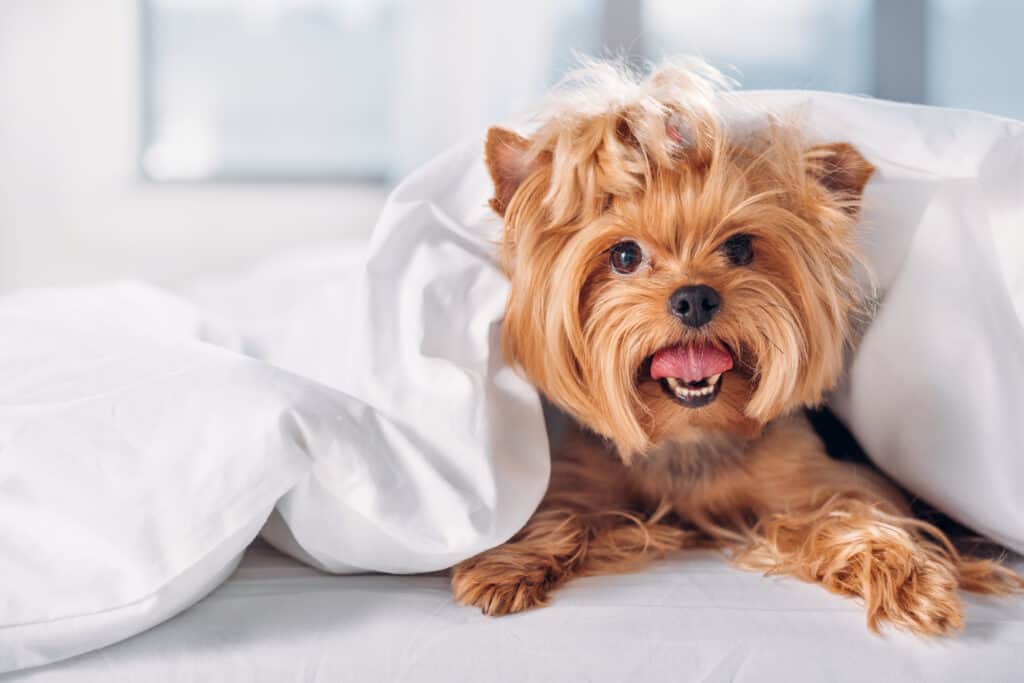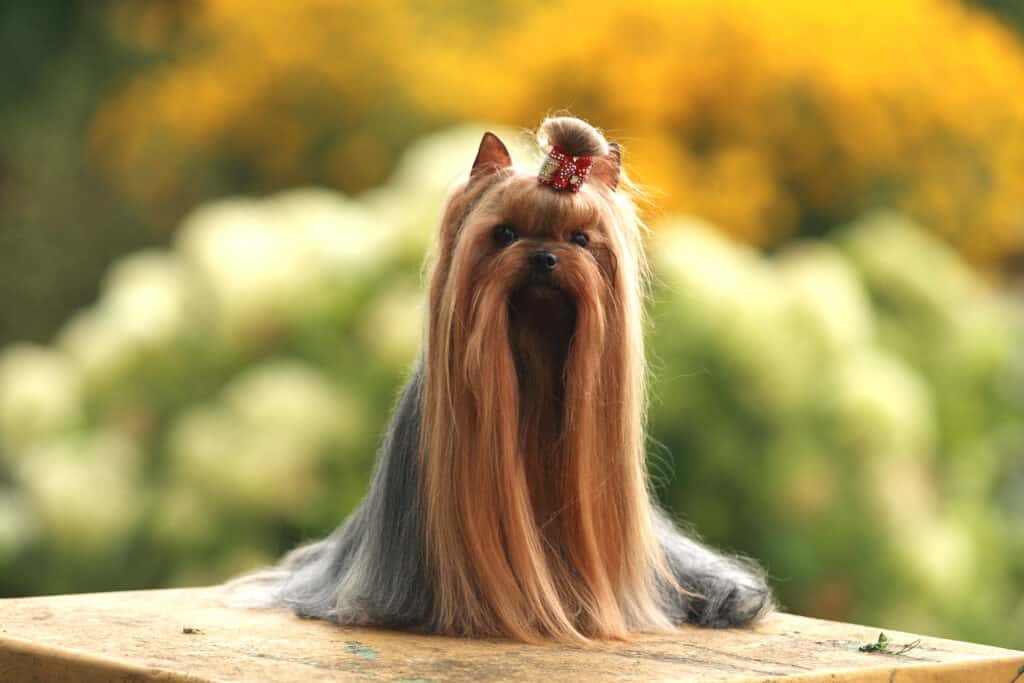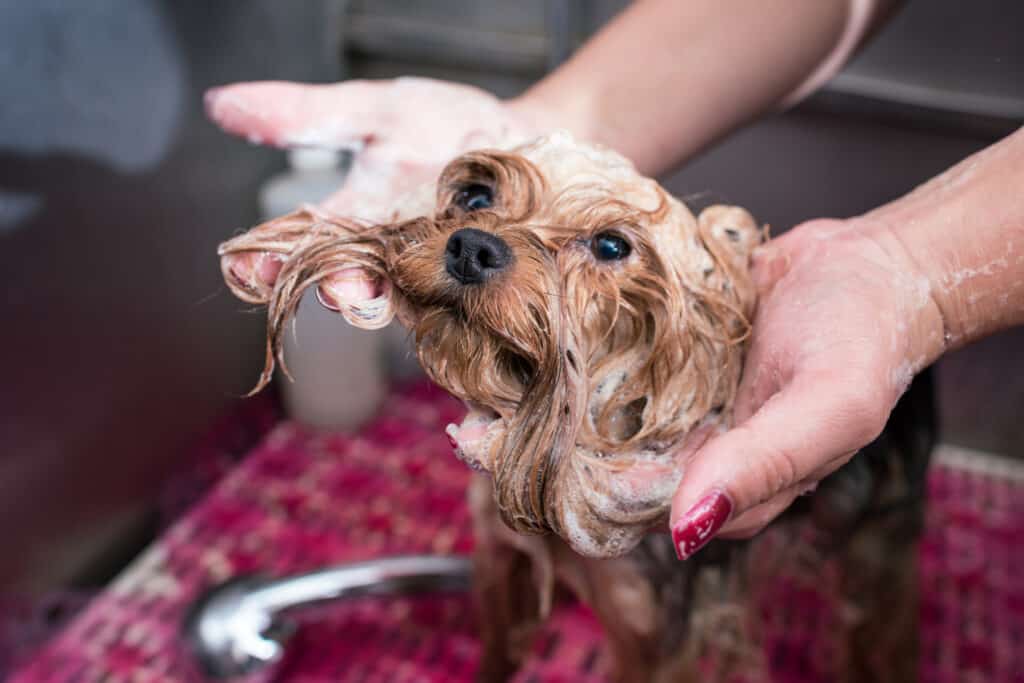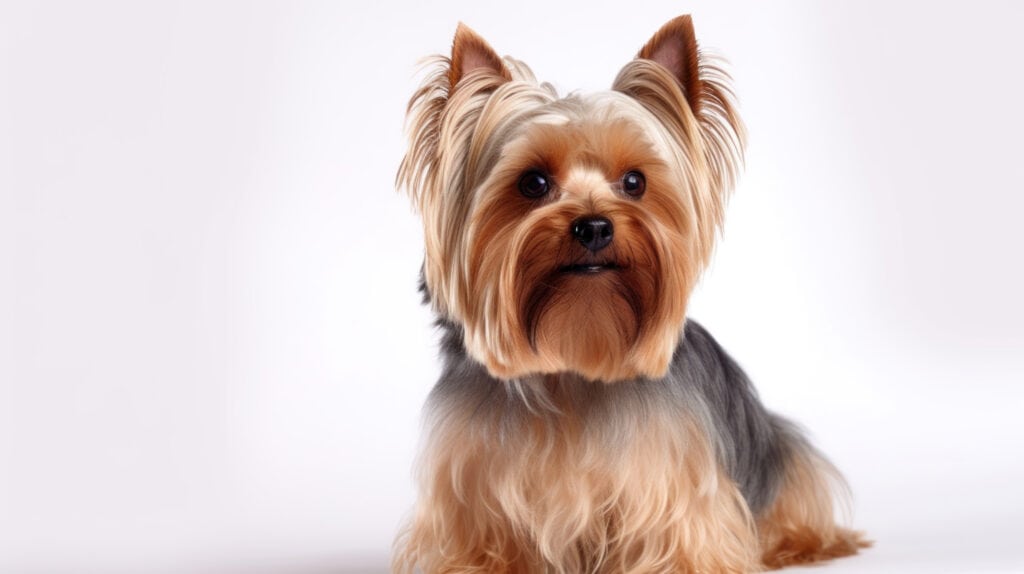Our website is supported by our users. We sometimes earn money when you click an affiliate link and make a purchase. This is at no extra cost to you and helps us to create quality content. Thank you for your support. For all that have shown us such wonderful support, we thank you from the bottom of our hearts!
The Yorkshire Terrier, often affectionately referred to as a “Yorkie,” is a small but highly energetic and affectionate companion dog.
Originating from the United Kingdom, these toy-size terriers have become one of the most popular breeds, thanks in no small part to their luxurious steel blue and tan coats that can grow to floor-length.
However, their beauty is not just skin deep; Yorkies are known for their spunky and spirited temperament.

Despite their diminutive size, Yorkshire Terriers are brimming with confidence and intelligence.
They often display an air of importance which might stem from their historical role in controlling rodent populations in coal mines and mills.
Today, they have adapted well to family life, forming close, loyal bonds with their owners.
Proper training and socialization are essential for a Yorkie, not just for obedience but also to keep their inquisitive minds stimulated.
Their small stature also contributes to a relatively long life expectancy, but being aware of common health issues is crucial for maintaining their overall well-being.
Key Takeaways
- Yorkies are toy-size terriers celebrated for their beautiful coats and bold personalities.
- They thrive on attention and training, benefiting from mental stimulation and social interaction.
- Awareness of their specific health and grooming needs can ensure a long and healthy life.
History of the Yorkshire Terrier
Your journey into the past of the Yorkshire Terrier begins in the 19th century in the county of Yorkshire, England.
Originating from the working class, these small yet feisty terriers were bred by Scottish weavers.
They found them quite valuable in textile mills for their skill in hunting vermin.
Breed Development:
- Ancestry: Their lineage includes the now-extinct Clydesdale Terrier or Paisley Terrier, and possibly the Skye Terrier.
- Purpose: Bred for work, their small size allowed them to navigate the narrow passages of mines and mills.
It’s not just the Yorkshire Terrier’s tenacity in the mills that’s notable.

During World War II, a Yorkshire Terrier named Smoky served bravely as a war dog and became famous for her heroic deeds.
Your appreciation for this breed might deepen as you reflect on their history of courage and utility, a contrast to their current reputation as companion dogs.
By the late 1800s, Yorkies had made the transition from mills to the laps of English high society.
Their fine silk coats and petite manner won them favor in Victorian homes.
The Biewer Terrier has its roots in the Yorkshire Terrier, as it originated from a specific breeding program within the Yorkshire Terrier breed.
In the 1980s, German breeders Mr. and Mrs. Biewer produced a Yorkshire Terrier puppy with unique blue and white markings.
This distinctive appearance led to the development of the Biewer Terrier as a separate breed, recognized for its striking coat colors and patterns.
While both breeds share common ancestry, the Biewer Terrier is distinguished by its distinct coat and color variations, setting it apart as a breed with a unique and visually appealing appearance within the canine world.
Recognition:
- The breed received its official name, “Yorkshire Terrier,” in 1874.
- Acknowledged by the American Kennel Club in 1885, the Yorkie has been a beloved companion across continents ever since.
Today, you can see Yorkshire Terriers almost anywhere, far removed from their humble and industrious roots in the mills and mines of Yorkshire.
Physical Characteristics of the Yorkshire Terrier

The Yorkshire Terrier is a toy dog known for its small size and distinctive, glossy coat colors ranging from black and tan to a fine, silky texture.
This breed is typically hypoallergenic, suitable for allergy sufferers.
Height Male
Male Yorkshire Terriers stand at about 7 to 8 inches tall.
Height Female
Female Yorkshire Terriers measure similarly to males, typically between 7 to 8 inches in height.
Weight Male
A healthy male Yorkshire Terrier should weigh close to 7 pounds.
Weight Female
Female Yorkshire Terriers usually weigh around 7 pounds as well.
Eye Colors
Yorkshire Terriers have dark, sparkling eyes that often convey their spirited nature.

Coat Colors
The coat of a Yorkshire Terrier can be black and tan, black and gold, blue and tan, or blue and gold.
Coat Types
The coat of a Yorkshire Terrier is one of its most distinguishing features:
- Texture: Glossy, fine, and silky
- Hypoallergenic: Yes, making them a preferred breed for those with allergies.
- Length: Long, often reaching the floor without proper grooming.
Life Expectancy
When considering the lifespan of a Yorkshire Terrier, it’s reassuring to know that you’re looking at a generally healthy breed.
Your Yorkie has a life expectancy of between 12 and 15 years, with some variations depending on care and genetics.
Studies have shown that on average, female Yorkies may enjoy a slightly longer life, often living up to an extra one-and-a-half years compared to males.
For optimal health and to potentially extend your Yorkie’s lifespan, proper care is essential.
This includes:
- A balanced diet
- Regular exercise
- Routine veterinary check-ups
- Dental hygiene
- Attention to any special medical needs
The oldest recorded Yorkie lived to an exceptional age, highlighting the breed’s potential for longevity under favorable conditions.
Maintaining a healthy lifestyle for your pet is paramount and can contribute significantly to their lifespan.
It’s equally important to be aware of common health issues that Yorkies may face, like respiratory problems and dental issues.
Such knowledge enables you to watch for early signs and seek treatment swiftly, enhancing the chances of a full recovery and a longer, healthier life for your furry companion.
Overall, with love and diligence, your Yorkie can be a part of your life for many joyful years.
Understanding Yorkie longevity and health can guide you in providing the best care for your pet.
Temperament & Training of the Yorkshire Terrier
Yorkshire Terriers, often known as “Yorkies,” are distinguished by their feisty and bold temperament.
Despite their small size, Yorkies are full of energy and often carry themselves with a confident, vivacious spirit.
This breed is known to be affectionate and loyal companions, attaching deeply to their owners.
However, their affectionate nature does not mean they are clingy; Yorkies are also known for their independence.
When it comes to play, these dogs are active and playful, enjoying engaging activities like fetch.
It’s not uncommon for them to be vocal, expressing their desires and needs.
This vocalization can also signal their stubbornness during training sessions.
In terms of training, Yorkies benefit greatly from mental stimulation due to their sharp minds.
They are quite capable in agility and obedience due to their alertness and eagerness to learn.
Training should start early, using positive reinforcement techniques and consistency.
Yorkies can be somewhat stubborn, so patience and persistence are key.
Thorough exercise needs must also be met to maintain their happiness and good behavior.
Daily walks and playtime are essential, but so is companionship.
They thrive on interaction and can become unhappy if left alone for long periods.
Here’s a quick reference on how to cater to a Yorkie’s temperament and training needs:
- Temperament: Active, Loyal, Vocal, Affectionate, Feisty
- Training:
- Start early with consistent sessions
- Focus on obedience and agility for mental stimulation
- Be patient and use positive reinforcement
Remember to honor their playful spirit while also setting clear boundaries to ensure that your Yorkie remains a happy and well-behaved companion.
Health Issues of the Yorkshire Terrier
Yorkshire Terriers, commonly referred to as Yorkies, may encounter several health problems that you should be aware of as an owner.
Nutrition plays a crucial role in maintaining your Yorkie’s well-being, especially considering the breed’s predisposition to certain conditions.
Hypoglycemia:
This is a condition marked by abnormally low blood sugar levels and is particularly of concern in Yorkie puppies.
Signs may include weakness, drowsiness, or even seizures.
Regular feeding of small, balanced meals can help manage and prevent this issue.
Dental Disease:
Dental health is important to maintain, as Yorkies are inclined to dental issues.
Brushing their teeth regularly and providing dental chews can help prevent periodontal disease.
Patellar Luxation:
This refers to a condition where the kneecap dislocates or moves out of its normal location.
You may notice your Yorkie limping or avoiding the use of a leg.
Tracheal Collapse:
A weak windpipe can lead to a collapsed trachea in Yorkies, causing a honking cough or difficulty breathing.
Keeping your Yorkie at a healthy weight and using harnesses instead of collars can reduce the strain on their trachea.
Liver Shunt: A liver shunt is a birth defect where blood bypasses the liver, leading to inadequate detoxification.
Symptoms can include poor growth and neurological issues.
Remember, regular veterinary check-ups can help detect these health problems early and improve the chance of successful management or treatment.
Grooming Your Yorkshire Terrier
Proper grooming is vital for your Yorkshire Terrier’s health and appearance.
By routinely brushing, bathing, and maintaining their coat, nails, teeth, and ears, you can keep them looking and feeling their best.
Brushing
Your Yorkshire Terrier’s fine, silky coat requires regular brushing to prevent knots and tangles.
Aim to brush your Yorkie’s coat several times a week using a high-quality pin brush or a slicker brush.
This practice not only minimizes shedding but also distributes natural oils throughout the coat, maintaining its glossy sheen.
Bathing
Bathing should be done monthly with a gentle, dog-specific shampoo to preserve the coat’s texture and sheen.
This massager really gets the soap down to your dog’s skin.
Ensure the water temperature is comfortable, and carefully rinse all soap out to avoid irritation.
High-quality pet shampoos are recommended for their drop silky coat, catering to their unique grooming needs.

Cutting Fur/Hair
Trimming or cutting your Yorkie’s hair can help maintain a manageable length and shape, ideally every 4 to 6 weeks.
Use proper grooming scissors for the job, taking extra care around sensitive areas.
You might opt for a professional groomer to achieve a specific style or trim.
Clipping or Grinding Nails
Long nails can cause discomfort or health issues.
Therefore, regular nail clipping or grinding is essential.
Use a nail clipper designed for small breeds to trim the tips, or a grinder to smoothly and safely shorten the nails.
Cutting and grinding your dog’s nails can be nerve wracking.
However, if you accidentally cut the quick and it begins to bleed, dip their nails in Styptic Powder.
If you need more information, check out our article on How to Grind Your Dog’s Nails.
And How to Clip Your Dog’s Nails Safely.
Dental Care
Good dental care includes brushing your Yorkie’s teeth at least two to three times a week with dog-specific toothpaste and toothbrush.
This helps prevent dental disease and keeps their breath fresh. Introducing this routine early in life will make it a simple part of your dog’s grooming habit.
Cleaning Ears
Lastly, you should check and clean your dog’s ears periodically to prevent wax buildup and infections.
Use a vet-approved ear cleaning solution, and gently wipe the outer ear with a soft cloth or cotton ball, avoiding deep ear canal intrusion.
Accurate, dedicated grooming ensures your Yorkshire Terrier remains healthy and happy, showcasing a well-maintained appearance.
Owning a Yorkshire Terrier
When considering adding a Yorkshire Terrier to your family, it’s important to be aware of the financial commitment, from initial purchase to ongoing maintenance.
There are also options to adopt, and you’ll need to choose whether to work with a breeder or look for a Yorkie in need of a new home.
Cost of Purchase
The initial cost to buy a Yorkshire Terrier from a reputable breeder can vary significantly.
Prices can range from $800 to $3,000, depending on factors like the dog’s bloodline, breeding, and whether the pup is deemed show quality.
Always research breeders thoroughly to ensure they uphold ethical breeding standards.
Maintenance Costs
Ongoing costs for your Yorkshire Terrier will include food, grooming, veterinary care, and possible health-related expenses. Here is a breakdown:
- Food: approx. $30 to $40 per month
- Grooming: between $30 and $60 per session (every 4-6 weeks)
- Routine Veterinary Care: around $100 to $300 annually
- Emergency Health Expenses: potentially $1,000+ depending on health issues
Remember, Yorkshire Terriers are known for their long, luxurious coats, which require regular maintenance.
Adopting a Yorkshire Terrier
Adopting from a shelter can be a more affordable option, with adoption fees typically ranging from $50 to $400.
This fee often includes vaccinations, microchipping, and spaying/neutering.
When you adopt, you’re giving a home to a Yorkie that may have been abandoned or surrendered.
Check local shelters and rescue organizations specializing in Yorkshire Terriers or small breeds.

Finding a Breeder
If you decide to buy from a breeder, do your homework to find someone reputable.
A responsible breeder will welcome questions about their breeding practices and be familiar with the breed’s needs and common health issues.
They’ll match you with a Yorkshire Terrier that fits well with your lifestyle, whether you’re looking for a family dog or a companion for young children.
Frequently Asked Questions
When exploring the world of Yorkshire Terriers, you’ll encounter common questions about their size, personality, maintenance, and cost.
This FAQ section aims to provide clear, concise answers.
What is the typical size and weight range for adult Yorkshire Terriers?
Adult Yorkshire Terriers typically stand between 7-9 inches tall and weigh around 4-7 pounds.
This toy breed size makes them ideal companions for small living spaces.
How does the Yorkshire Terrier’s personality affect its suitability as a house dog?
Yorkshire Terriers possess a bold and confident personality, often displaying affection and intelligence, which can make them excellent house dogs.
However, their terrier heritage also means they can be assertive and require consistent training.
What maintenance requirements are commonly associated with Yorkshire Terriers?
Yorkshire Terriers are known for their long, fine, and silky coats that require regular grooming to prevent tangles and matting.
Additionally, these dogs need regular dental care and exercise to stay healthy.
Can Yorkshire Terriers be left alone during the day, and if so, for how long?
While Yorkshire Terriers can be left alone for short periods, they generally thrive on interaction and companionship.
Typically, adult Yorkies can be left alone for up to 4-5 hours, provided they have ample water and a safe, comfortable space.
Why do Yorkshire Terriers tend to be more expensive compared to other dog breeds?
Yorkshire Terriers often come with a higher price tag due to factors like their popularity, the cost of breeding small dogs, and their distinctive looks.
Breeders also factor in health screenings and the care required for the puppies before they go to their new homes.
Bottom Line on the Yorkshire Terrier

Yorkshire Terriers, affectionately known as Yorkies, have established themselves as beloved lapdogs in the United States and beyond.
As a proud owner of a Yorkie, you’ll discover they are far more than just a small dog breed; they boast a big personality that often seems to forget their toy size.
In terms of companionship, you have a loyal pet that thrives on attention and interaction.
With their history as watchdogs, they’re vigilant and tend to be loud towards strangers, alerting you with their distinctive barking at any perceived threats.
Yet, when it’s just the two of you, Yorkies can be quite quiet and content in your lap.
If you’re someone with a busy lifestyle, these toy dogs adapt well but remember they require regular play and exercise to channel their energetic nature positively.
Despite their gusto, Yorkies aren’t suited for extreme cold weather due to their coat and temperature sensitivity.
When you bring a Yorkshire Terrier into your life, prepare for a dynamically small dog breed with the heart of a lion.
They’re perfect for those who desire an energetic and affectionate companion who can play all day and yet be a steadfast watchdog when needed.
Please read our Legal Disclaimer








